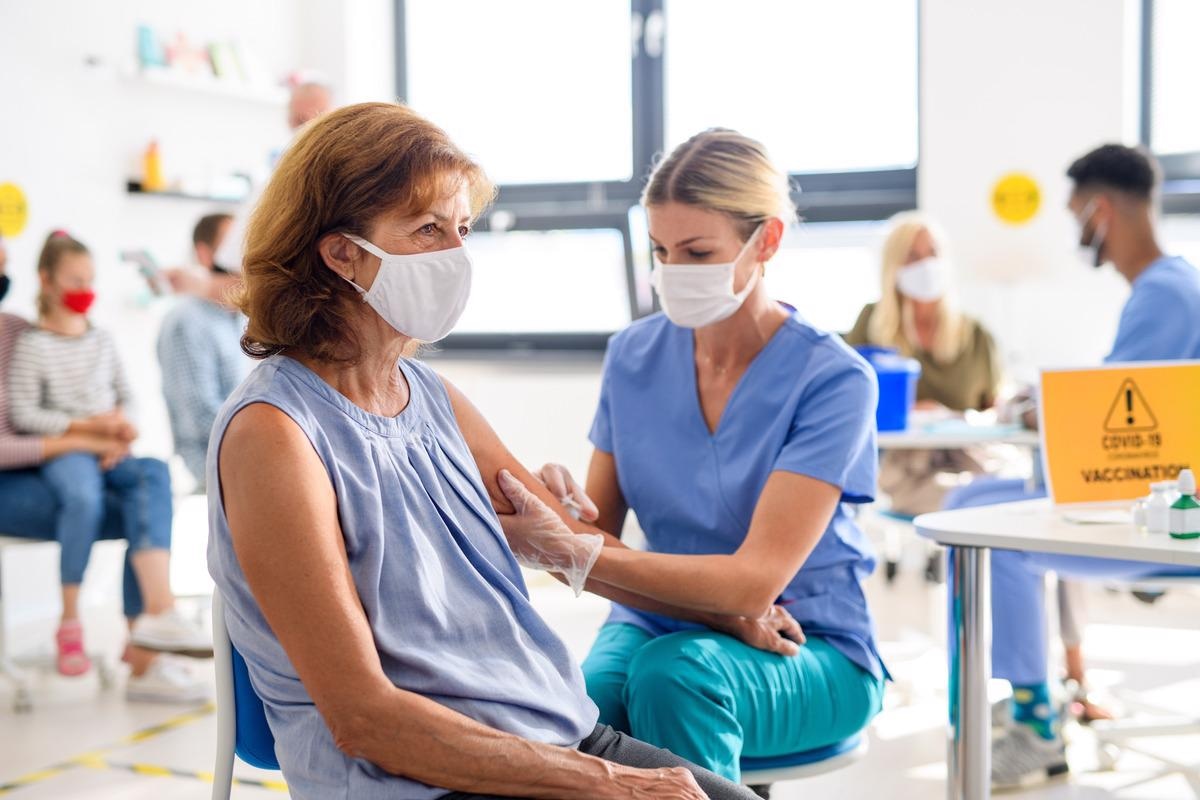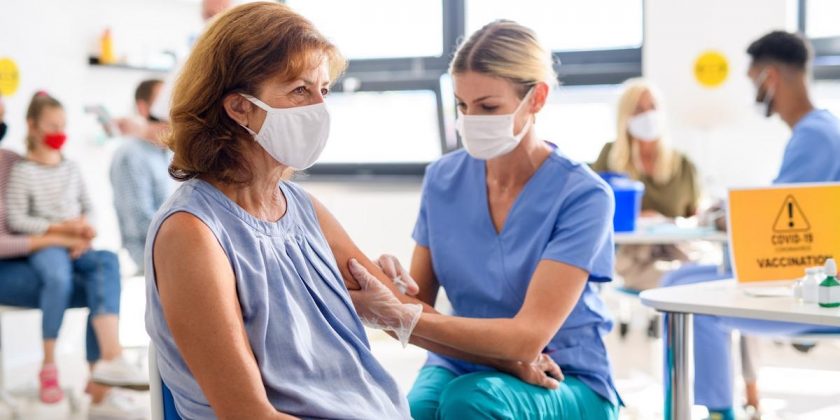A recent study posted to the Research Square* pre-print server and currently under consideration at Scientific Reports, investigated the various factors affecting the acceptance rate and trust in severe acute respiratory syndrome coronavirus 2 (SARS-CoV-2) vaccines in countries with high rates of vaccination.
 Study: Factors Influencing the Acceptance of COVID-19 Vaccines in a Country With a High Vaccination Rate. Image Credit: Halfpoint/Shutterstock
Study: Factors Influencing the Acceptance of COVID-19 Vaccines in a Country With a High Vaccination Rate. Image Credit: Halfpoint/Shutterstock
Globally, the coronavirus disease 2019 (COVID-19) pandemic has caused over 404.9 million confirmed cases, including more than 5.7 million deaths to date. Various studies have reported the efficacy of COVID-19 vaccines in preventing infections, disease severity, and related hospitalizations across different populations. However, hesitancy in accepting the vaccine and its effectiveness has been observed across the general public, which affects the global handling of the pandemic.
About the study
The present study examined the aspects that affect the level of acceptance and trust of the public in the effectiveness of COVID-19 vaccines in Chile, a country with a high vaccination rate.
An online cross-sectional survey of adults in Chile was conducted using structured questionnaires. The questionnaires were validated in three steps – content validity evaluation, construct validity, and reliability. Between 21 May, 2021, and 21 June, 2021, the questionnaire was made available via an online platform to participants aged over 18 years. Out of the 744 individuals who answered the questionnaire, 58% belonged to the metropolitan region of Chile while 42% were from other parts of the country.
The questionnaire examined vaccination-related variables including public willingness in vaccine acceptance, trust towards efficacy, perceptions of vaccines, and socio-demographic factors. Outcome variables related to public willingness were estimated in reference to acceptance of primary SARS-CoV-2 vaccines, booster vaccine doses after completion of the primary vaccination schedule, annual vaccination, and administering vaccines to children. Explanatory variables with reference to trust in vaccines, stakeholders, social and press coverage of vaccine-related data were also evaluated.
The perception of individuals of COVID-19 vaccine effectiveness was evaluated on an ordinal scale of values one (not effective) to four (highly effective). The study also examined individuals’ perception of the risk of COVID-19 infection, the level of concern regarding the possible side effects of vaccine administration, and the perceived level of information they had about the COVID-19 vaccines. Furthermore, the study assessed the number of individuals who thought that vaccination can allow relaxation of measures against SARS-CoV-2 infection, prevent further infection, reduce the risk of severe disease, and terminate the pandemic. The team also evaluated the perceived impact of the pandemic on the individual’s quality of life.
Results
The study results showed that 93.4% of the participants had been administered with at least one SARS-CoV-2 vaccine dose, 3.9% were unsure of their acceptance of a vaccine, and 2.7% would certainly not accept a COVID-19 vaccine. A total of 88.2% of the participants affirmed that they would accept a booster vaccine dose while 57.8% conveyed that they would readily accept annual vaccination, if necessary. Around 62.5% of participants reported that they would accept a COVID-19 vaccine for their children aged less than 16 years.
Varying levels of trust were observed in different vaccines. Trust in the CoronaVac and Pfizer vaccines was similar and significantly greater than the other four vaccines approved in Chile. No noteworthy difference was observed in the trust in CanSino, AstraZeneca, Johnson & Johnson, and Sputnik V vaccines. Despite the differences in trust levels, a high-reliability coefficient was reported for all the vaccines.
Multivariate models indicated that one unit value of trust in the COVID-19 vaccines led to a 4.1 times increase in the readiness to accept primary vaccination doses, a 3.2 times increase in booster dose acceptance, a 2 times increase in the acceptance of annual vaccination, and a 1.9 times increase in the willingness to accept vaccination for children.
A significant correlation was observed between all the variables of willingness and trust in COVID-19 vaccines in women and also between acceptance of annual vaccination and trust in COVID-19 vaccines in men. Notably, in both adults and younger adults, an increase in trust in vaccine efficiency led to an increase in willingness to accept a primary COVID-19 vaccine, a booster dose, an annual vaccination schedule, and vaccination for children.
Conclusion
The study findings concluded that a high willingness to accept a SARS-CoV-2 booster vaccine dose, vaccination in children 16 years and younger, and annual vaccination, was observed in the participants from Chile. The willingness to accept the vaccine depended upon the level of trust in medical professionals, scientists, and different forms of media.
A significant factor influencing the acceptance of primary vaccines, vaccination for children, and booster doses was the perceived risk of disease severity due to COVID-19 infection. The researchers believed that the present study can be employed to develop robust communication strategies to improve the public trust and willingness to accept COVID-19 vaccines.
*Important notice
Research Square publishes preliminary scientific reports that are not yet peer-reviewed and, therefore, should not be regarded as conclusive, guide clinical practice/health-related behavior, or treated as established information.
- Daniela Toro-Ascuy, Nicolas Cifuentes-Munoz, Andrea Avaria et al. (2022). Factors Influencing the Acceptance of COVID-19 Vaccines in a Country With a High Vaccination Rate. Research Square. doi: https://doi.org/10.21203/rs.3.rs-1200606/v1 https://www.researchsquare.com/article/rs-1200606/v1
Posted in: Medical Science News | Life Sciences News | Medical Research News
Tags: Children, Coronavirus, Coronavirus Disease COVID-19, covid-19, Efficacy, Pandemic, Research, Respiratory, SARS, SARS-CoV-2, Severe Acute Respiratory, Severe Acute Respiratory Syndrome, Syndrome, Vaccine

Written by
Susha Cheriyedath
Susha has a Bachelor of Science (B.Sc.) degree in Chemistry and Master of Science (M.Sc) degree in Biochemistry from the University of Calicut, India. She always had a keen interest in medical and health science. As part of her masters degree, she specialized in Biochemistry, with an emphasis on Microbiology, Physiology, Biotechnology, and Nutrition. In her spare time, she loves to cook up a storm in the kitchen with her super-messy baking experiments.
Source: Read Full Article
